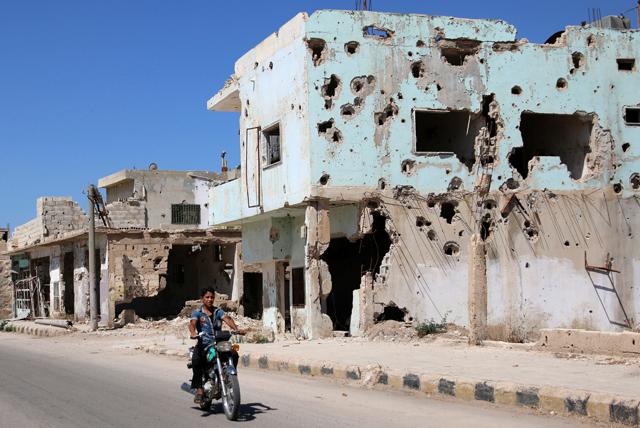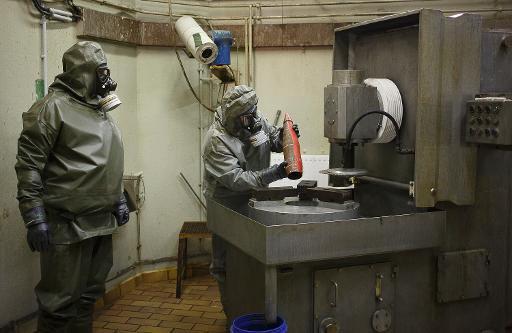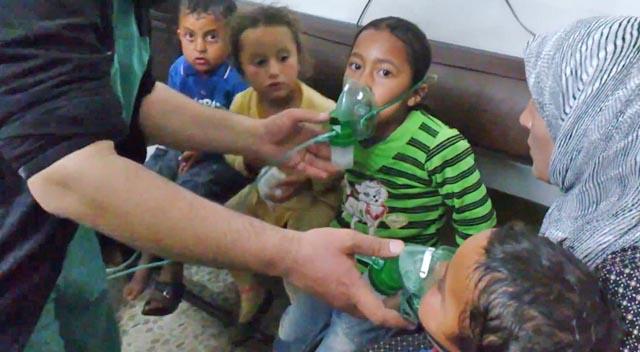You are here
Western intelligence suggests Syria can still produce chemical arms
By Reuters - Apr 26,2014 - Last updated at Apr 26,2014

UNITED NATIONS — Syria maintains an ability to deploy chemical weapons, diplomats say, citing intelligence from Britain, France and the United States that could strengthen allegations Syria’s military recently used chlorine gas in its bloody civil war.
The comments reflect a growing conviction among Western capitals that President Bashar Assad has failed to come clean about Syria’s chemical weapons programme despite his promises to end it, and they insist the United States and its allies will resist calls by Assad to shut down a special international chemical disarmament mission set up to deal with Syria.
Syria denies it maintains the capacity to deploy chemical weapons, calling the allegation a US and European attempt to use their “childish” policies to blackmail Assad’s government.
But in a tacit acknowledgement of the original declaration’s incompleteness, Syria earlier this month submitted a more specific list of its chemical weapons to the international disarmament mission after discrepancies were reported by inspectors on the ground, officials said.
Under threat of US air strikes, Assad agreed with the United States and Russia in September to dispose of his chemical weapons — an arsenal that Damascus had never previously formally acknowledged — after hundreds of people were killed in a sarin gas attack in August on the outskirts of the capital.
Washington and its Western allies said it was Assad’s forces who unleashed the sarin attack, the world’s worst chemical attack in a quarter-century. The government blamed the rebel side in Syria’s civil war, which is now in its fourth year.
The verification of Syria’s declaration on its poison gas arsenal and its destruction has been overseen by a joint team of the United Nations and the Organisation for the Prohibition of Chemical Weapons (OPCW), the global chemical arms watchdog.
Diplomats say Western governments have long suspected Syria did not declare all aspects of its chemical arms programme. But the envoys say they have kept silent on the issue to avoid giving Assad an excuse to curtail cooperation with the UN-OPCW mission and slow down an already delayed timetable for shipping toxins out of the country.
With more than 90 per cent of Syria’s declared chemical stockpiles now out of the country, Western officials have started to break their silence.
“We are convinced, and we have some intelligence showing, that they have not declared everything,” a senior Western diplomat told Reuters, adding that the intelligence had come from Britain, France and the United States.
When asked how much of its programme Syria has kept hidden, the diplomat said: “It’s substantial.” He offered no details.
Ambiguities and discrepancies
Syrian UN Ambassador Bashar Ja’afari dismissed the charge.
“These countries aren’t really reliable and their policies towards the implementation of the agreement between the Syrian government and the OPCW aren’t principled but rather childish,” he said in a mobile phone text message to Reuters.
“If they have some evidence they must share it with the OPCW rather than pretending to have secret evidence!”
Ja’afari said the three Western powers’ goal was to needlessly extend the UN-OPCW mission by “keeping the ‘chemical file’ open indefinitely so that they can keep exerting pressure and blackmailing the Syrian government”.
Another Western official, who also spoke on condition of anonymity, told Reuters that while there was not 100 per cent certainty Syria maintains chemical weapons, the three Western powers agreed that there is a “high level of probability” that Syria deliberately under-reported the full extent of its chemical arms-related stockpiles.
He cited examples of large batch of a sarin precursor chemical going missing in Syria and Damascus’ unverified claims to have destroyed most of its mustard gas stocks before the UN-OPCW mission arrived in the country and other anomalies.
In interviews over the last two months with Western officials with access to intelligence about Syria, Reuters learned that topics of concern include deadly nerve agent ricin, mustard gas, precursor chemicals used to make sarin, and, more recently, the use of chlorine gas in Syria.
US and British officials have also spoken of ambiguities and problems with the Syrian chemical weapons declaration. US officials warned as early as November that intelligence suggested Syria may try to hide some toxins.
Suspicions that its declaration was incomplete deepened when Syria did not report to the OPCW having sarin, which was used in the outskirts of Damascus on August 21, or the type of rockets used to deliver an estimated 300 litres of the toxin.
The senior Western diplomat said Britain, France and the United States had provided information to the OPCW months ago, including on specific undeclared chemical weapons sites. He added that the three powers had also provided Assad’s staunch ally Russia with the intelligence but “they have not reacted”.
The OPCW had no immediate comment when queried. A Russian UN mission spokesman said he had no comment, though Moscow reiterated on Friday its position that claims about the Syrian government using chemical weapons were false.
Related Articles
BEIRUT — The Syrian government has denied a UN report accusing it of a sarin attack in April that killed scores of people, state media said
More than half of Syria’s declared chemical weapons arsenal has been shipped out or destroyed within the country, the head of the international team overseeing the disarmament process said on Thursday.
The head of the global chemical weapons watchdog overseeing the destruction of Syria’s toxic stockpile is considering launching a fact-finding mission on his own initiative to investigate reports of chlorine gas attacks there, sources said.

















